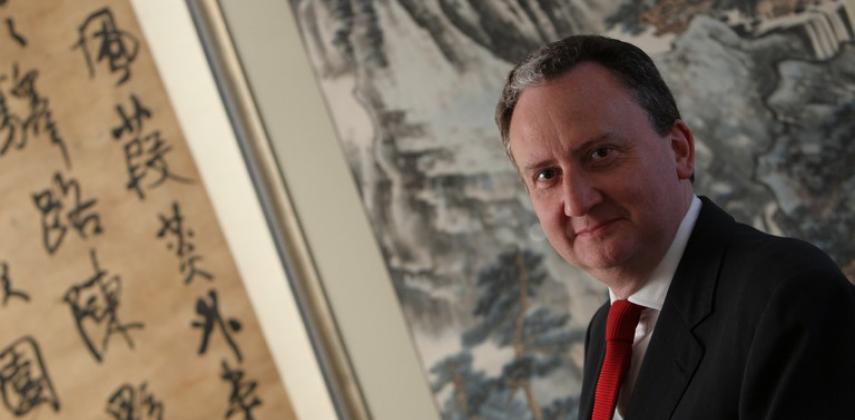Jonathan Stone, the managing director of Asia and international business director of Asian art and antiquities for Christie’s, is a respected voice in the art sector and a seasoned business leader. From a base in Hong Kong, he currently oversees the management, financial control, and strategic direction of the firm’s specialist Asian art departments, with something of a focus on buyer activities and securing business.
Stone joined Christie’s after taking an MA in art history at London University’s Courtauld Institute of Art and worked first as a specialist, then as head of department during the next 10 years. Transferring from London, he became the firm’s representative director in Tokyo and, in 2005, international business director for Japan.
Before studying art history, Stone had worked in Japan for several years in the field of branded consumer products. He is fluent in Japanese and holds a master’s degree in history from Peterhouse College, Cambridge. He talks to Jan Chan.
In your current position, what does it take to manage the business successfully?
Firstly, you need to listen carefully to internal and external clients. Our representatives and specialists have very close relations with important contacts, and they understand their own categories and geographic markets very well. For me, it is therefore a question of listening to them and, of course, to our clients, as well as working closely with our international management to decide strategies for the region and for each department.
Which techniques do you use to motivate and inspire staff?
We are very fortunate in this business because people are extremely passionate about their jobs. Everybody is amazingly dedicated and the commitment is almost tangible. After running one of the specialist departments in London for 10 years, I know how and why people have those feelings about their work. It is very exciting to “crack” the important clients and to be involved in transferring some of the world’s greatest works of arts from one collector to another. It is also important, though, to maintain transparency in management decisions and ensure people are kept well informed.
What do you do to enhance your abilities as a leader?
The key thing is that you are always willing to learn. Time and the experience that comes with it mean you are learning the whole time, whether about leadership or other kinds of skill. But it is also important to take the initiative and push yourself. In addition, leadership is matter of not being afraid to take difficult choices and tough decisions and, if necessary, being ready to explain your reasons. Personally, I also learn a lot by observing senior people, both in my own field and in other types of business, and realise that, to be a good leader, you sometimes need to put yourself in other people’s shoes to see what it will take to make a connection.
In practical terms, how do you make people enjoy their jobs?
There is no sure way, but what you can do is enable people to grow, develop, and realise their full potential. If they also see their work is appreciated, they will soon understand that it is not just about material rewards, but also a way to achieve personal fulfilment and broader recognition.
What do arts and antiquities mean to you?
Art is an aspect of creativity which completely distinguishes mankind from the animal kingdom. On an intellectual level, works of art represent some of the highest accomplishments of human civilisation. They give us a window to look not only into the soul of the artist, but also into our own souls and, perhaps, of the people around us. That is what makes certain works of art great.
What are your greatest challenges?
In terms of business, the greatest challenge and the greatest opportunity is to keep developing Christie’s in Asia and in China. To move forward, we have to encourage enthusiasm for art and, at the same time, give passionate collectors in the region the chance to find and acquire the kind of works they want.
Which non-work ambitions do you hope to achieve in the next five years?
I would like to continue educating myself about art, history, culture and people. I need to travel quite often and wherever I go, even on a business trip, it’s always interesting to do some homework and learn a little bit about the place beforehand. Even if there is no spare time to get out and about, you have more to talk about with the people you meet and continue to learn about the world and develop new interests.
What advice do you give young people in Hong Kong?
Former US president Franklin Delano Roosevelt said, “The only thing we have to fear is fear itself”. That’s a useful viewpoint to bear in mind. People should not be afraid to test themselves and go beyond their usual comfort zone, especially when they are still young and have so much in front of them.
Integrity is key
- Stone believes that it is essential to work with integrity whichever field you are in
- Feels that managers should be able to recognise and admit when they are wrong
- Finds that it is not easy to keep work and personal life separate, as the two often seem to overlap
- Tends to check his Blackberry addictively even outside work hours


